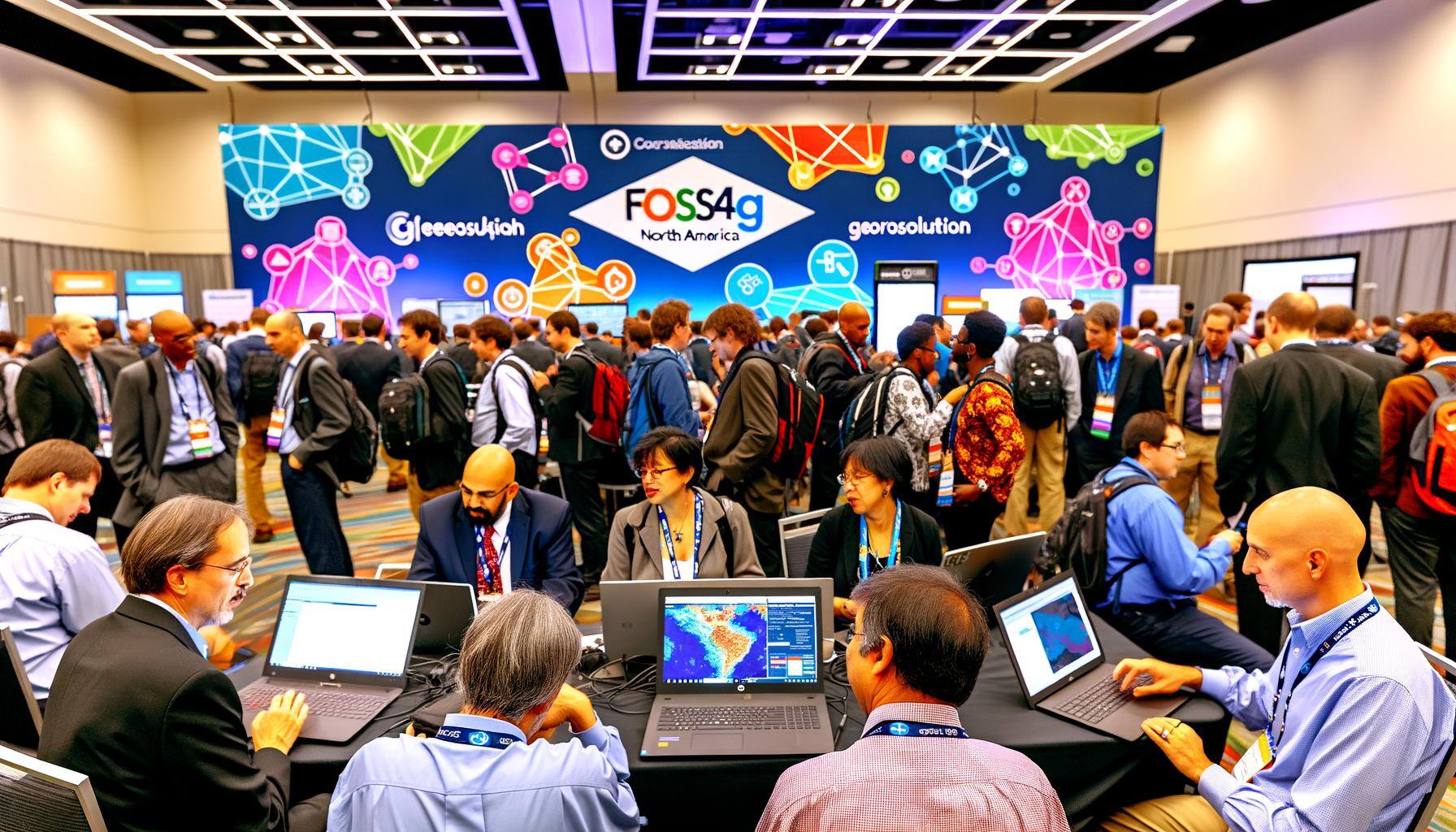NLT Team to Present at FOSS4G-NA 2024
NLT Team to present at FOSS4G-NA 2024 in St. Louis, showcasing the integration of open-source and proprietary geospatial technologies!
Explore how New Light Technologies is leading the way in geospatial technology innovation through key insights and advancements presented at FOSS4G North America and GeoResolution 2024.


New Light Technologies (NLT) has long been dedicated to pioneering advancements in geospatial technology. Our recent participation in two major industry events—FOSS4G North America 2024 and GeoResolution 2024—underscores this commitment. These events provided a platform for us to showcase our state-of-the-art solutions and engage with thought leaders from across the geospatial sector, fostering a deeper understanding of the transformative potential of geospatial science.
At FOSS4G North America 2024, NLT took center stage as a lanyard sponsor, presenting on the vital topic of leveraging software investments and geospatial solutions to meet customer missions. This was followed by our participation as an exhibitor at GeoResolution 2024, where we demonstrated our AI/ML platforms, cloud-native solutions, and geospatial data science capabilities. Both events highlighted our role in advancing geospatial innovation and our ongoing efforts to address some of the world's most pressing challenges through cutting-edge technology.
FOSS4G North America 2024, held from September 9-11 in St. Louis, MO, is widely regarded as the premier conference for geospatial technology and business. The event attracted a diverse audience, including technologists, end-users, academics, and decision-makers, all eager to explore the latest trends and innovations in the geospatial field.
NLT’s presentation, led by our Founder & CEO, Ghermay Araya, and Principal Data Scientist, Garrett Tate, focused on maximizing existing geospatial technology investments. We highlighted how organizations can enhance flexibility, efficiency, and interoperability by incorporating innovative solutions, thereby delivering greater value to their users. This presentation resonated with many attendees, sparking numerous discussions on the future directions of geospatial technology.
One of the key themes of our presentation at FOSS4GNA 2024 was the importance of maximizing geospatial investments to meet mission-critical challenges. As the geospatial industry continues to grow—projected to nearly triple in size over the next decade—the ability to integrate and optimize geospatial tools becomes increasingly crucial for organizations across various sectors.
Our approach emphasizes flexibility and customization, allowing organizations to tailor geospatial workflows to their specific needs. This is particularly relevant in areas such as disaster response, climate change, and economic development, where the ability to quickly adapt and respond to changing conditions is essential. By leveraging advanced geospatial solutions, organizations can improve their operational efficiency and achieve their missions more effectively.
The geospatial market is evolving rapidly, driven by increasing demand for geospatial technologies and solutions. Insights gathered from attendee surveys at FOSS4GNA 2024 revealed several key trends:
These trends reflect the growing complexity of the geospatial landscape and the necessity for solutions that can support a wide range of use cases and industries. NLT remains committed to developing innovative solutions that meet these evolving needs and help organizations unlock the full potential of their geospatial investments.
Following FOSS4GNA, NLT’s participation at GeoResolution 2024, held on September 12 at Saint Louis University, further emphasized our commitment to geospatial innovation. Co-sponsored by the Taylor Geospatial Institute & the National Geospatial-Intelligence Agency (NGA) and hosted at Saint Louis University (SLU), GeoResolution 2024 focused on the development of geospatial models, such as digital twins, that can address critical global challenges.
Digital twins—virtual models that mirror real-world environments—are revolutionizing industries like urban planning, climate science, and disaster response. These models enable organizations to simulate and analyze complex systems, providing valuable insights that can inform decision-making and improve outcomes. At GeoResolution 2024, we showcased how our digital twin solutions are helping organizations tackle some of the most pressing challenges of our time.
GeoResolution 2024 also highlighted significant advancements in AI and big data, two areas that are driving the future of geospatial innovation. From GeoAI to big data processing, the event showcased the cutting-edge technologies that are shaping the geospatial industry.
At our exhibit, we demonstrated how our AI/ML platforms and cloud-native solutions are enabling organizations to harness the power of big data. By integrating AI and machine learning with geospatial data, we are helping organizations gain deeper insights, improve predictive capabilities, and enhance decision-making processes. These advancements are not only transforming the geospatial field but also providing new opportunities for innovation and growth.
A significant focus of GeoResolution 2024 was the future of the geospatial workforce. As the industry continues to evolve, there is a growing need for professionals with the skills to advance digital twin technologies, AI, and geospatial modeling. Workforce development is critical to ensuring that the industry can meet the demands of the future.
At NLT, we are committed to supporting the development of the next generation of geospatial professionals. We engage in initiatives that promote education and training in geospatial science, and we collaborate with academic institutions to provide opportunities for students and young professionals. By investing in workforce development, we are helping to build a strong foundation for the future of geospatial innovation.
NLT’s participation in FOSS4GNA and GeoResolution 2024 reinforced our commitment to cross-sector collaboration and the importance of advancing geospatial solutions. As the industry continues to evolve, we remain at the forefront, providing innovative solutions that help organizations unlock the full potential of their geospatial investments.
Looking ahead, we are excited to continue expanding our partnerships with government, academia, and industry. By fostering collaboration and driving technological innovation, we are shaping the future of geospatial science and ensuring that our customers can meet their missions with confidence. Whether it’s supporting disaster response efforts, driving sustainability initiatives, or empowering economic development, NLT’s expertise and dedication to innovation make us a trusted partner for organizations globally.
New Light Technologies’ active participation in FOSS4G North America 2024 and GeoResolution 2024 highlights our unwavering commitment to geospatial innovation. By showcasing our cutting-edge solutions and engaging with industry leaders, we continue to push the boundaries of what is possible in geospatial science. As we look to the future, we are excited to build on these successes and drive further advancements in geospatial technology. Through collaboration, innovation, and a dedication to excellence, NLT is helping to shape a better, more connected world.
NLT Team to present at FOSS4G-NA 2024 in St. Louis, showcasing the integration of open-source and proprietary geospatial technologies!
Join us on DMV GIS Day 2024 to celebrate geospatial excellence with keynotes, panel discussions, and a special proclamation from Mayor Bowser....
Uncover how New Light Technologies is revolutionizing disaster management with their IMPACT platform at Geo Week 2025.
Stay updated with the latest insights and innovations from our experts. Subscribe now to receive exclusive content, industry updates, and behind-the-scenes looks at our team's work.